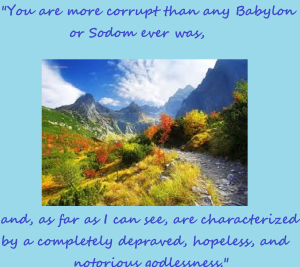 A little more than a year ago, I wrote this blog post, expressing my annoyance that Martin Luther is often incorrectly associated with certain liberal ideas such as a mistrust of organized religion and the subjectivity of biblical interpretation. Seriously, Martin Luther is among the most misquoted historical figures of all time. According to the Editor’s Introduction to the Augsburg Confession in the 2006 publication of the Book of Concord, the time-honored tradition of grossly misquoting Luther dates back to 1519 in a book written by John Eck for the purpose of turning people against Luther. But I think that some of the current non-Lutheran viewpoints associated with Luther actually have the opposite purpose; they come from some people’s desire to claim that Luther’s reforms were heading in the direction that certain current denominations are going. At any rate, Luther never wanted the Bible to be subject to personal interpretation and he by no means believed that religion is a one-on-one individualistic relationship with God that doesn’t have anything to do with church. That’s basically what I said in the aforementioned blog post from last summer.
A little more than a year ago, I wrote this blog post, expressing my annoyance that Martin Luther is often incorrectly associated with certain liberal ideas such as a mistrust of organized religion and the subjectivity of biblical interpretation. Seriously, Martin Luther is among the most misquoted historical figures of all time. According to the Editor’s Introduction to the Augsburg Confession in the 2006 publication of the Book of Concord, the time-honored tradition of grossly misquoting Luther dates back to 1519 in a book written by John Eck for the purpose of turning people against Luther. But I think that some of the current non-Lutheran viewpoints associated with Luther actually have the opposite purpose; they come from some people’s desire to claim that Luther’s reforms were heading in the direction that certain current denominations are going. At any rate, Luther never wanted the Bible to be subject to personal interpretation and he by no means believed that religion is a one-on-one individualistic relationship with God that doesn’t have anything to do with church. That’s basically what I said in the aforementioned blog post from last summer.
It has come to my attention since then, though, that Martin Luther’s name has also become associated with transcendentalist ideas. There are a number of popular bogus Luther quotations that get posted all over the internet, and I am aware of one particular facebook page that bears Martin Luther’s name, but has posted the words of Romantic-era transcendentalist poets with the assertion that they have some connection to Luther’s teachings. I later unfollowed that page after noticing that the admin had done that kind of thing on several occasions, but I am disturbed to know that such a page exists and that there are many people who repost those things with the idea that those heretical (or, at best, heterodox) quotations are profound, true, and consistent with Lutheran beliefs.
Transcendentalism is the philosophical idea, associated with Romantic-era literature as well as with a few much older beliefs, that nature is itself divine. Depending upon who is being quoted and what the context of the statement is, transcendentalists may assert either that there is no God apart from the natural world, that God speaks to us directly through the natural world, or that He can be studied by immersing oneself in the natural world. Transcendentalism can be rectified with various different beliefs about what God or the gods are like, but it is not consistent with biblical Christianity. In all fairness, I suppose it is technically possible for someone to be a Christian with a transcendentalist point of view, but this cannot be supported by scripture and is not in keeping with Lutheran doctrine. (I am here defining “Christian” as a person believing in the existence of the triune God, viewing the Bible to be God’s Word, and having faith in the salvific work of Jesus Christ, who was both true God and true man and who lived a sinless human life and died on the cross and rose from the dead to pay for the sins of all humankind so that we may have eternal life in heaven.)
 There are several fake Luther quotes out there that speak about finding God in nature. The most famous of these is “God writes the Gospel not in the Bible alone, but also on trees, and in the flowers and clouds and stars.” Another one, which is very similar and perhaps is just a variation on the same quotation, says, “Our Lord has written the promise of resurrection not in books alone, but in every leaf in springtime”. There are others out there on the internet that are along the same vein. Not only have the people of the internet been unable to cite a source for these statements, but they don’t even sound like Luther. Martin Luther’s rhetoric is not known for being cutesy and fluffy. He certainly had a way with words, but he often used it to disagree with people who taught false doctrine. Basically, if you can use a quotation as the caption for a beautiful and inspirational picture of the natural world, either it’s probably not a Luther quotation, or you’re probably pretty bad at captioning your pictures. Here’s a website that gives genuine Luther quotations. (I would like to point out for the record that Luther did not specialize exclusively in insults and name-calling; he also had much of importance and significance to say about God.)There’s also a twitter page where someone posts these Luther insults in response to false doctrine that Joel Osteen puts on Twitter. Frankly, I think that Martin Luther would approve of this posthumous use of his words. It’s very much in keeping with the way he used them when he was alive. It’s certainly more consistent with Luther’s personality and his beliefs than are vague transcendentalist statements about finding God in nature.
There are several fake Luther quotes out there that speak about finding God in nature. The most famous of these is “God writes the Gospel not in the Bible alone, but also on trees, and in the flowers and clouds and stars.” Another one, which is very similar and perhaps is just a variation on the same quotation, says, “Our Lord has written the promise of resurrection not in books alone, but in every leaf in springtime”. There are others out there on the internet that are along the same vein. Not only have the people of the internet been unable to cite a source for these statements, but they don’t even sound like Luther. Martin Luther’s rhetoric is not known for being cutesy and fluffy. He certainly had a way with words, but he often used it to disagree with people who taught false doctrine. Basically, if you can use a quotation as the caption for a beautiful and inspirational picture of the natural world, either it’s probably not a Luther quotation, or you’re probably pretty bad at captioning your pictures. Here’s a website that gives genuine Luther quotations. (I would like to point out for the record that Luther did not specialize exclusively in insults and name-calling; he also had much of importance and significance to say about God.)There’s also a twitter page where someone posts these Luther insults in response to false doctrine that Joel Osteen puts on Twitter. Frankly, I think that Martin Luther would approve of this posthumous use of his words. It’s very much in keeping with the way he used them when he was alive. It’s certainly more consistent with Luther’s personality and his beliefs than are vague transcendentalist statements about finding God in nature.
I have no doubt that Martin Luther was as capable as anyone else of acknowledging the beauty of certain aspects of the natural world, and that he appreciated the fact that God had created that beauty. You don’t have to look any farther than the Small Catechism (for example, the explanation to the first article of the creed) in order to see that Luther saw creation and every good thing in it as a direct gift from God. But there’s a big difference between acknowledging that God created something good and thinking that he communicates with us through it.
It is commonly said by Christians of all denominations that we can see God’s hand in the natural world, and this is certainly true to some extent, but God does not literally speak to us through nature. In fact, the existence and beauty of the world around us obviously does not constitute proof of the existence of God, because if it did, there would be no atheists or agnostics. Even if someone was to conclude that there is a God just by looking at plants and rocks and shining lakes and majestic sunsets, they wouldn’t be able to know anything else about God from those sources of information.
 One truth that we can learn from the natural world is that people aren’t the only beings that experience disease, destruction, and death. Even in a relatively wild and untouched place, there will be plants and animals that suffer and die and rot, and that may suffer and/or look ugly in the meantime. While it’s true that the creative hand of God can be seen in nature, the destructive effects of sin are also written there very clearly. And nature doesn’t tell us which is which; if it wasn’t for the actual real Word of God, we would have no way of knowing that God gave us a perfect world and that it was sin that damaged it. Many people actually do see the imperfection of the world as evidence that God either doesn’t exist or that he isn’t entirely benevolent. Those are the doubts that come from ignoring the Biblical teachings about sin. Furthermore, the natural world doesn’t inform us that this destruction caused by sin isn’t the end of the story, that God has already fixed things for us. There is nothing in nature that tells us about Jesus’ incarnation and death and resurrection. To receive all of that crucial information, we need the real Word of God, which is the Bible. And Luther never said anything to the contrary; he firmly believed in Sola Scriptura.
One truth that we can learn from the natural world is that people aren’t the only beings that experience disease, destruction, and death. Even in a relatively wild and untouched place, there will be plants and animals that suffer and die and rot, and that may suffer and/or look ugly in the meantime. While it’s true that the creative hand of God can be seen in nature, the destructive effects of sin are also written there very clearly. And nature doesn’t tell us which is which; if it wasn’t for the actual real Word of God, we would have no way of knowing that God gave us a perfect world and that it was sin that damaged it. Many people actually do see the imperfection of the world as evidence that God either doesn’t exist or that he isn’t entirely benevolent. Those are the doubts that come from ignoring the Biblical teachings about sin. Furthermore, the natural world doesn’t inform us that this destruction caused by sin isn’t the end of the story, that God has already fixed things for us. There is nothing in nature that tells us about Jesus’ incarnation and death and resurrection. To receive all of that crucial information, we need the real Word of God, which is the Bible. And Luther never said anything to the contrary; he firmly believed in Sola Scriptura.
Anyone who claims that Luther said or believed otherwise is misrepresenting him. And anyone who says or believes otherwise themselves is placing faith in something other than God by reading divine messages into something that God has never said He would use to communicate with us. It’s essentially a belief in omens and signs, no different than in many pagan religions. At best, it’s a form of superstition that shouldn’t blend with Christianity, and at worst, it’s a completely non-Christian religion that is particularly evil because it falsely calls itself Christianity.




